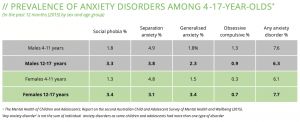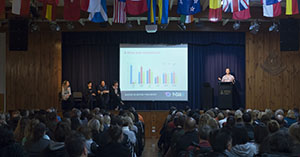While anxiety is normal, it can develop into a disorder.
Most of us feel anxious at times. But for some people the anxiety is serious enough to negatively affect their enjoyment of life. Almost 7 per cent of Australian children and adolescents – or 278,000 – have an anxiety disorder. Most are considered mild.
Anxiety disorders generally include social phobia, separation anxiety, generalised anxiety and obsessive-compulsive disorder. A major Australian study* found that these affected 6.9 per cent of those aged four to 17. There was little difference in prevalence between girls and boys.
Young people in the most-disadvantaged socioeconomic group (10.4 per cent) were twice as likely to have an anxiety disorder than those in the least-disadvantaged group (5.3 per cent).
Young people with an anxiety issue need support to cope with the challenges they face, such as doing well in year 12, taking on leadership roles at a younger age and pressure to feel accepted on social media. Parents must be alert for signs that they are not coping and seek professional help if needed.
Risk Factors
- A family history of anxiety;
- Having a perfectionistic personality;
- Lack of confidence or self-esteem;
- Family and relationship problems;
- Having a controlling or over-protective parent, or parents who are often critical or negative in their parenting style;
- Death or loss of a loved one;
- A traumatic or negative life experience;
- Verbal, sexual, physical or emotional abuse or trauma;
- Serious physical illness; and
- Girls, or women, are more likely to develop anxiety disorders.
Anxiety Disorders
Social Phobia
Intense anxiety caused by social situations leading up to and during the event, such as going out with friends or giving a speech.
Separation Anxiety
An overwhelming fear of being parted from parents, carers or those to whom someone has a strong attachment.
Generalised Anxiety
Excessive anxiety and worry about common issues, such as family or friends, health, work, money or forgetting important appointments.
Obsessive Compulsive Disorder
An obsessive compulsion to do something, such as checking doors and windows to see if they are locked, or ensuring everything is orderly in cupboards and drawers.

Tips for Parents
- Anxiety is normal. Excessive anxiety is not.
- Young people with genuine anxiety disorders are not naughty or defiant.
- Look for persistent physical symptoms such as headaches, stomach aches, vomiting, tiredness as well
as missing school and avoiding social activities. - If the anxiety relates to a mental-health disorder such as generalised anxiety, obsessive compulsive disorder, phobias, social anxiety and panic attacks, seek professional help.
- Teaching and modelling resilience can help young people cope with anxiety.
- Admit when you are anxious; no one is perfect.



